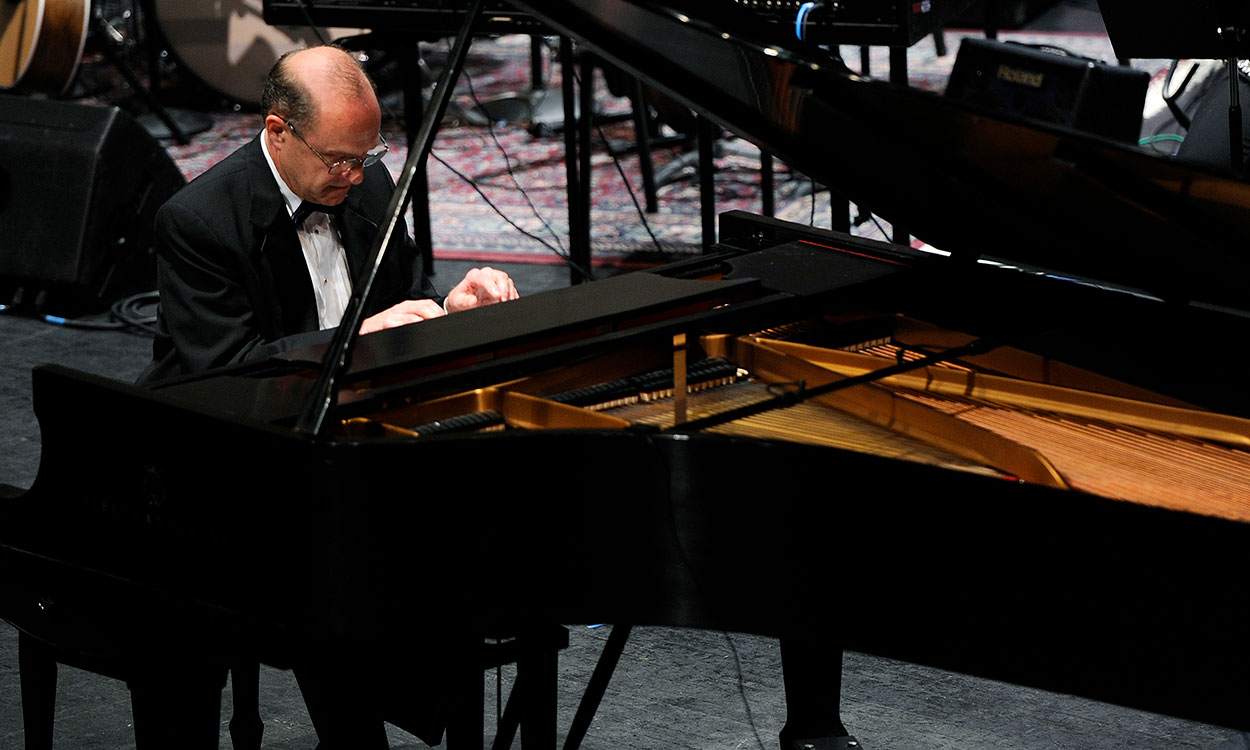Trustees name performing arts college in honor of late chancellor

WCU’s late Chancellor David O. Belcher performs on piano in the performance hall of the university’s arts center.
The academic unit that is home to Western Carolina University’s programs in music, stage, screen, art and design will be known as the David Orr Belcher College of Fine and Performing Arts in honor of the late WCU chancellor, who died June 17 at the age of 60 after battling brain cancer for more than two years.
The university’s Board of Trustees unanimously approved the naming of the college for Belcher in recognition of his background as a classically trained pianist and his impact on higher education and the arts at WCU and across Western North Carolina. The action came during a special conference call board meeting Monday, July 2.
Patricia B. Kaemmerling, WCU board chair, said the trustees decided to name the College of Fine and Performing Arts for Belcher in celebration of his talents as a musician, his transformational leadership of the university during his seven-year tenure as chancellor, and the financial contributions that he and wife Susan Brummell Belcher have made to provide significant scholarship support to students majoring in the fine and performing arts.
“Although Chancellor Belcher worked tirelessly on behalf of all WCU students, there was a special place in his heart for those students studying music, theater, film and television production, art, design and dance because of his own background as a pianist,” Kaemmerling said. “David and Susan Belcher became supporters and friends of artistic endeavors at WCU when they first set foot on this campus, and it is fitting that the Board of Trustees honor Chancellor Belcher by formally and permanently affixing his name to the college in which future careers in the fine and performing arts will be realized.”
The college’s dean, George Brown, called the board’s decision “a wonderful commemoration of a life well lived,” borrowing a phrase that served as the theme of Belcher’s June 23 memorial service.
“The College of Fine and Performing Arts, where Chancellor Belcher held his academic appointment, is proud to bear his name and mantle of continuing to inspire and educate our exceptional students here in Western North Carolina, both as artists and citizens of the world,” Brown said. “We will honor his legacy, as we, too, believe in the transformational power of education, by actively working to make our region and the lives of our people better through the power of the arts. As Chancellor Belcher says, ‘We are in the business of changing lives.’”
Founded in 2007, the College of Fine and Performing Arts serves as the cultural heart and creative showcase of WCU. The mission of the college is to “inspire, educate and train the next generation of artists, scholars and teachers in the intellectual foundations and creative processes of the fine and performing arts while fostering excellence and artistic curiosity across Western North Carolina and beyond.”
The college consists of the School of Art and Design, School of Stage and Screen, and John W. Bardo Fine and Performing Arts Center, which contains a 1,000-seat performance hall and WCU’s Fine Arts Museum. The college also includes the School of Music, where Belcher held his academic credentials, tenured at the rank of full professor.
Students from any program in the College of Fine and Performing Arts are eligible for the Susan Brummell Belcher College of Fine and Performing Arts Endowed Scholarship established by Belcher in honor of his wife last year, while students in the School of Music are eligible for the Chancellor’s Music Scholarship supported by Belcher.
The college has 60 faculty artists and scholars who work alongside 13 professional staff members to serve more than 700 students majoring in the college’s programs. It serves thousands of other students across campus and the entire WNC region through educational opportunities and hundreds of music concerts, theatre and dance performances, student showcases and recitals, film screenings, exhibitions of visual arts, lectures, guest artists and pep band performances. The college also is home to the nationally recognized Pride of the Mountains Marching Band, recently invited for the second time within five years to march in the Macy’s Thanksgiving Day Parade in New York City.
WCU’s chancellor since 2011, Belcher went on medical leave Dec. 31, 2017. After being diagnosed in April 2016, he underwent surgery to remove a glioblastoma brain tumor in May 2016, followed by an 11-month treatment plan that initially seemed successful. But in early August 2017, he informed the WCU campus that he had experienced a recurrence of the cancer and, in late November 2017, announced his plan to go on medical leave at the end of the calendar year, with no plans to return to his position.
University policy on name designation for facilities and academic units allows for the naming of appropriate spaces in recognition of exceptional service to WCU, higher education and/or the people of North Carolina by members of the university faculty, staff or student body after they have completed employment or enrollment, said Acting Chancellor Alison Morrison-Shetlar.
“I hope that Chancellor Belcher would be well pleased by this recognition, which strikes me as an appropriate coda to his career as an artist and an educator,” Morrison-Shetlar said. “While he may have left us – and far too soon, at that – his legacy will live on through the creative and pedagogical endeavors of those who will follow in his footsteps.”
Prior to his appointment at WCU, Belcher served at the University of Arkansas at Little Rock from 2003 until 2011 as provost and vice chancellor for academic affairs, and at Missouri State University from 1988 until 2003, first as coordinator of keyboard studies in the Music Department (1989-1992), then as assistant dean (1993) and dean (1994-2003) of the College of Arts and Letters.
Belcher graduated from Furman University in 1979 with a degree in piano performance. After receiving a master’s degree in the field at the University of Michigan in 1981, he studied in Vienna, Austria, on a Rotary Foundation Graduate Fellowship before earning his doctorate in 1989 at the University of Rochester’s Eastman School of Music. While a student at Eastman, he received the Jerald C. Graue Memorial Scholarship for excellence in musicological research. Throughout his career, he appeared widely as a recitalist and chamber musician and was active in civic and community organizations.

